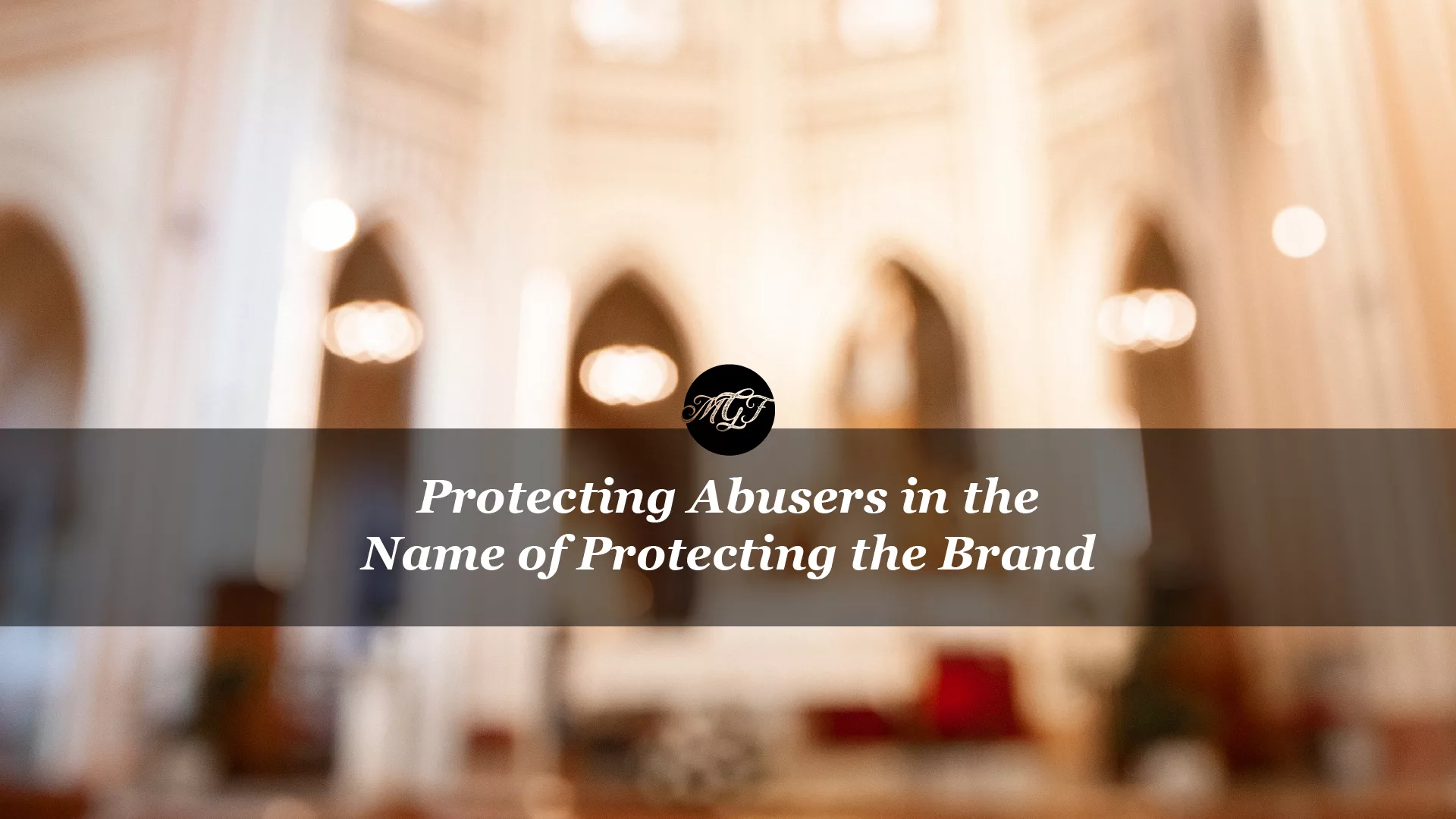What happens when church leadership not only protects abusers but sets up a system to enable them?
We Forgot How to “People”
A friend of mine once lamented to me that her main grievance with the Church today is that we just don’t know how to “people.” For an institution that was created firstly to worship God and secondly, to make disciples, we have certainly forgotten that people are the key factor to both of those things. People are the heart and soul of a church because a church would not be necessary were it not for the existence of people. Perhaps that sounds redundant, but it’s an important point, and here’s why: today, we’ve made the Church the central figure. Today, we’ve made the brand the hero. Today, we’ve sacrificed the people in the name of the entity.
And because of that, spiritual abuse runs rampant.
What do I mean by making the Church the central figure? In this article about my Deconstruction, I talk about the attractional methodology that is rampant in churches today. As a rule, the modern Church is more concerned with numbers than it is with actual people. And it’s creating a huge problem.
What Happens Behind Closed Doors
If a church is so wrapped up in getting more and more people through the doors that they forget to love, disciple, and nurture the people who are already there — especially ones they’ve already hurt — there’s a problem. I have seen this play out so many times it makes me want to vomit. So often pastors (from lead pastors down to the executive staff and even mid-level lackeys) become so obsessed with protecting their image and the image of the church, that they forget that the people ARE the church. They use corporate phrases like “protecting the brand.” They warn the staff that if they ever say anything against the church publicly, they will be fired. They discipline members who question anything. And they brush aside members who are hurt and don’t make them look good.
Most of this is done behind closed doors. Most of this is kept secret, played close to the chest. Most pastors and their lackeys act like this because they truly think they’re doing something noble. In their twisted thinking, by protecting the “entity” they’re protecting the people they will potentially reach. I’ve witnessed it firsthand — they truly believe it is more important to protect the organization in the name of “reaching more people.” The irony of that way of thinking is that the same people who claim to love and care about people so much blatantly and brazenly ignore the very people their system hurts.
They don’t realize they’ve got it backward.
Manipulation in the Name of Protection
Recently I was made aware of the book: Good Christian Girl. In it, the author shares the story of how she was sexually harassed by a pastor, emotionally manipulated, and then brushed aside by her church leadership because she made the pastor who spiritually abused her uncomfortable. The book is an eye-opening, firsthand account of what happens when church leadership decides that protecting the reputation of the entity and its leadership is more important than the people inside its walls.
In the book, we meet a young, twenty-something woman who was an unpaid volunteer in her church for years, having stepped into the position under the guise that she was working her way toward a place on the worship team. Laying aside the infuriating fact that ANY entity would require someone to do free manual labor as a means to earn their way onto a volunteer team, we follow her as the worship pastor began to incrementally groom her, eventually attempting to solicit sexually explicit images from her. The morning after he requested the images from her (which she did not give him), he texted her to say that his phone had been hacked and that he was sorry if anything strange had happened to her the night before. She was relieved to know her pastor wasn’t a scumbag.
Unfortunately for her, he was much worse than that.
Soon after that exchange, the worship pastor went to church leadership to confess. Not to confess to his victim… but to church leadership. This might seem like an arbitrary point — he confessed, after all. Surely that’s enough. But in this story, it becomes clear how leaders make their own rules and then manipulate them to gaslight their victims. In this case, all the girl thought at this point in the story was that her pastor’s phone had been hacked. Meanwhile, he was meeting with church leaders to inform them what happened.
The only way she knew he had confessed at all was because she was called into the church offices to have a meeting with the worship pastor and one of the executive pastors. The worship pastor apologized to her in the presence of the executive pastor. Afterward, the executive pastor informed her that she should forgive him because “that’s what good Christians do.”
We could stop there for the sole reason that the worship pastor didn’t bother to apologize to her first, didn’t bother to inform her that he was going to tell the leadership what he had done before she could, and oh yeah, had lied to her by saying his phone was hacked. By going to the leadership before ever confessing the truth to her, he was able to control the narrative, manipulate the outcome, and force her hand.
But it gets worse.
The last little bit of the meeting was to inform the young woman that she could no longer be an intern for the worship team because it would make it too difficult and uncomfortable for the worship pastor.
Let me reiterate: because the worship pastor might have been uncomfortable around the woman he had solicited explicit images from, the woman was punished.
Don’t misread: this is not a feminist rant. I would be just as infuriated if the tables were turned. What burns me up is the fact that the church leadership, instead of rushing to the defense of the early-twenties, wide-eyed young woman, immediately punished her for the worship pastor’s sins. The pastor was protected, not her. The pastor was made the hero in the subsequent pages, by the way. Why? Because he took a six-week (forced) sabbatical and “worked on his marriage.”
Great. So proud.
The girl, however, was left to wonder what she had done to make him want her. She was left to wonder if she was a temptress in disguise and just didn’t know it. No one counseled her. No one offered her advice or wisdom or even a crying shoulder. Instead, again and again, she was told to be thankful that the worship pastor’s marriage was restored, to be happy for them, and to look to them as the example of how marriage should be.
Do you see it?
Protect the institution. Forget the people.
So Many Stories
I cannot tell you how many times I have witnessed this play out firsthand. When I take inventory of the things I have witnessed over the years, it even surprises me. If nothing else, it reminds me that we are far too quick to overlook moral failures on the part of leadership.
» I witnessed the aftermath of an affair on staff at a church where the man (a pastor) was made into the hero because he confessed first, without telling the woman he was about to confess, even though he had promised her he would never say anything without telling her first (it’s much easier to control the narrative that way, you see). The woman (who was also on staff) was immediately labeled the “other woman” (a.k.a the temptress) because the man’s wife decided to forgive him. Immediately. (This, though it sounds familiar, is NOT the same story as the one above.)
» I witnessed a pastor inform his staff that the reason one of his founding members and original staffers was leaving was because she was moving away. She didn’t move away. That was never her plan. She left because the church was toxic, but instead of facing that reality, the pastor made it look like she just needed a clean start for personal reasons. Subsequently, no one spoke to her or reached out to her because they all thought she lived hours away. She spent two years in utter isolation, questioning her faith before anyone at the church reached out to realize what had happened to her.
» I witnessed a pastor justify his affair by saying that God told him to have it, and then fire everyone on his staff who had the gumption to tell him he had heard wrong. (I cannot begin to tell you how many times I have heard pastors use “God told me to” as an excuse to commit atrocious moral failings, but I digress.)
» I witnessed pastors use phrases like, “You’re hard to love;” “I cannot be your pastor anymore;” “That’s not in our DNA;” “We need to think more like a corporation.”
» I’ve witnessed pastors attempt to turn wives against their husbands in order to “get on board with the mission” of the church.
» I witnessed a pastor tell the congregation the reason the worship leader was stepping down was because she had informed him that she “wasn’t called to ministry after all.” She had never uttered those words before and stood before the congregation dumbfounded by the reason the pastor had given. By using that excuse, the pastor was able to stave off questions about why the worship pastor would step down in the first place. Control the narrative, you see. Control it at all costs.
» I witnessed a pastor tell an employee who reached out in confidence to voice concerns over the behavior of one of the volunteers, “We have looked into the situation and can assure you that there is nothing wrong.” Three months later, those exact concerns were brought to light: the volunteer had been having an affair, and church staff had ignored it because he was super talented and charming.
Over and over again, I’ve watched pastors and leaders in the church refuse to lead with integrity, refuse to handle difficult situations with Biblical standards, and brazenly ignore continual moral failures. And all in the name of keeping leadership comfortable and keeping the church name unmarred. The irony, of course, is that all it does is quietly mar the name until the church is utterly unrecognizable, leaving a trail of wounded and fallen soldiers as far as the eye can see. But it seems to matter little to these kinds of leaders. It seems all they can see are the people in their doors right now. It seems all they care about is what’s happening now with the people who aren’t bruised and bleeding yet.
But they’ll bruise and bleed too. And eventually, they’ll leave. And these self-focused pastors will pat themselves on the back for all the new people who’ve come through their doors — a whole new crop of people to destroy.
All in the name of the institution.
What is Grace, After All?
I know what many of you are going to say about this. I can hear your retorts now. How do I know? Because I have made the very same ones a thousand times.
“What about showing grace? Wouldn’t we want to be given a second chance too? If we can’t forgive, how can we call ourselves Christians?”
These are valid questions and I’m glad you (proverbially) asked them. The truth is, we should extend grace. We should give second, third, even twelfth chances. We should forgive.
But we can do those things without keeping people in leadership who should not be there.
Grace might mean forgiveness and second chances. But it does not mean:
- Ignoring warning signs
- Forgetting behavior patterns
- Pretending as if problems don’t exist
- Telling ourselves if they’ve confessed, they’ll never be tempted again
- Giving leadership positions to people who have no business being there
- Keeping people in leadership positions who have proven they’re not fit
- Ignoring clear scriptural mandates for the qualifications of leadership
In the case of the story from the book, if it had truly been a redemption story of the worship pastor going to her first to confess and ask for forgiveness; if he had then confessed to his wife, then his leadership; if he had been asked to step down from leadership and discipled specifically and intensely for a long period of time; if he had then been given a chance to serve in a lesser, unpaid role that would not tease his pride; if he had served there humbly and joyfully for many years (I suggest serving in the internship role he had abused, but I digress); then maybe we could have a talk about him stepping back into the worship team in some capacity.
But not as the leader.
He forfeited that chance by abusing his position. Full stop.
Does that sound harsh? Perhaps. Does it sound lacking in grace? If it does, I ask you to go back to scripture and see how Christ treated the religious leaders. He did not tip-toe around them. He did not pat their heads and tell them it was okay that they were abusing the people and the system. He was direct, clear, and even harsh with them. He showed them none of this so-called “grace” that is rampant in the Church today. Why? Because scripture is very clear: pastors are to be held to a higher standard.
I think we’ve forgotten this very important detail.
Not many of you should become teachers, my fellow believers, because you know that we who teach will be judged more strictly. ~James 3:1
This is a trustworthy saying: “If someone aspires to be a church leader, he desires an honorable position.” So a church leader must be a man whose life is above reproach. He must be faithful to his wife. He must exercise self-control, live wisely, and have a good reputation. He must enjoy having guests in his home, and he must be able to teach. He must not be a heavy drinker or be violent. He must be gentle, not quarrelsome, and not love money. He must manage his own family well, having children who respect and obey him. For if a man cannot manage his own household, how can he take care of God’s church? A church leader must not be a new believer, because he might become proud, and the devil would cause him to fall. Also, people outside the church must speak well of him so that he will not be disgraced and fall into the devil’s trap. ~1 Timothy 3:1-7
It’s painfully clear from these passages that a church leader has a critical role. It is a role that should never be taken lightly. Read the 1 Timothy passage again and ask yourself if the leaders in your church could live up to that list. I know I’ve been a part of more churches than I care to admit that conveniently overlooked some or all of those stipulations. In the case of the worship pastor from the book, the evidence of his unfitness for leadership continued long after what he did to that girl. Did he continue to cheat on his wife in that manner? I don’t know. I doubt anyone knows for sure. But there is a field of bodies lying prone on the battlefield of his so-called ministry, wounded and bleeding, some who have walked away from their faith completely, some who are questioning everything, all because one man continued in his pattern of pride, making his team members feel unworthy, ignoring them, lying to their faces again and again, saying one thing and doing another, elevating himself all while telling everyone how humble he was. We know him by his fruit. The fruit of that ministry has been destruction. The author of that book is one in a long line of people before and after her. But because he was able to sweep the brazen issues neatly under a rug, he was allowed to continue to lead as a pastor. Because he could operate in the same sins in a more surreptitious manner, he was elevated as the example everyone should follow.
Taking a Stand
It infuriates me. To the core. It lights a fire in me that people get so hurt again and again and nothing changes. It disgusts me that churches pretend like these things don’t happen, sweep them under the rug, and pat themselves on the back for avoiding scandal.
Folks, we have to fight for the Church if we ever want to see her in her glory again. We have to stand firm on scripture and hold fast to its precepts. We have to continually submit ourselves, our ambitions, our thoughts, and our hearts to the Will of the Father. And we have to be willing to hold ourselves to account.














